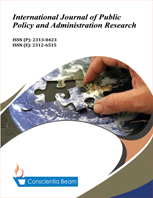Public-Private Partnership as a Strategy for E-Governance Funding in Africa: The Gains and the Pains
DOI:
https://doi.org/10.18488/journal.74.2018.52.37.47Abstract
African countries have joined other continents across the globe to embrace e-governance as a strategy to provide with ease public services to her citizens. The quest for e-governance stems from the fact that the traditional means of providing public services have not yielded the utmost results needed. Thus, the earnest desires to use electronic means to provide public services for Africans. Making available these services effectively using ICTs demands the existence of some critical success factors. One of these factors to successfully accomplish the goals of e-governance projects is funding. However, e-governance projects are highly capital intensive and hence, often knotty for governments to foot the expenditures through the normal annual operating expenditure (budget). Financing e-governance using the normal annual budgetary approach rarely guarantees solid funding. In view of the global financial and economic crisis facing many countries which have actually affected their budget execution, most government the world over have resorted to financing e-governance using several alternatives such as public private partnership (PPP). Although, no robust statistical analysis was done as the article relied qualitative approach with emphasis on archival analysis of relevant literature on the subject matter and inferences drawn from it. This paper infers from the documentary analysis that PPP has numerous potential gains to cushion the effects of the financial and economic crisis and that it is capable of making the implementation of e-governance projects a reality in African. However, the paper also reveals that despite its viability as an alternative measure to financing e-governance projects in Africa just as obtainable in other climes, it is imperative to address some latent limitations of PPP in order to seamlessly enhance its implementation in e-governance projects in Africa.

